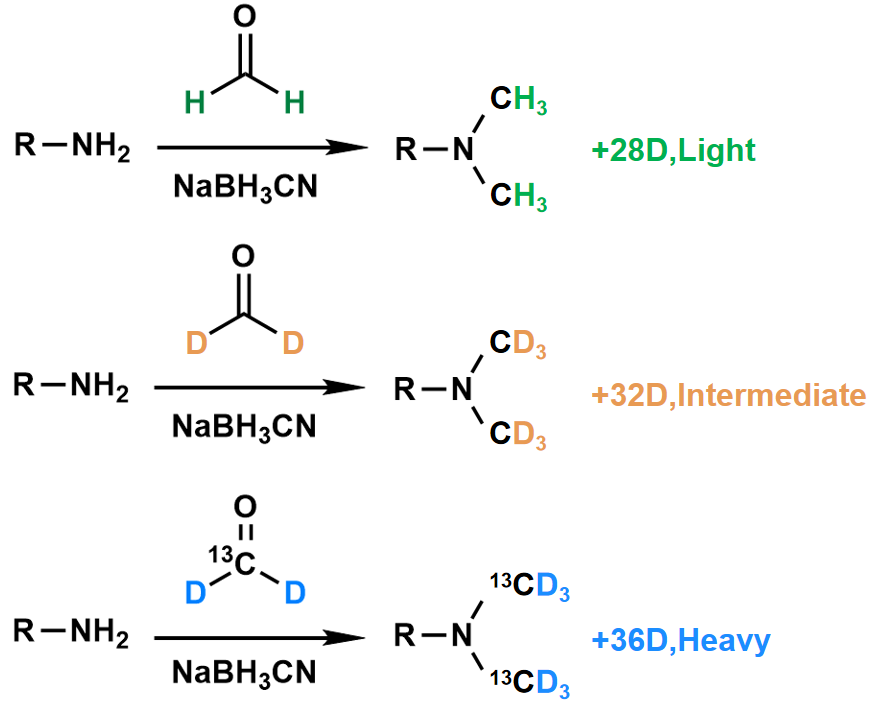Dimethyl labeling Service
Dimethyl labeling is a stable isotope-based chemical labeling technique used in quantitative proteomics to study protein expression and post-translational modifications. By reacting formaldehyde isotopes and reducing agents with the primary amines of peptides, dimethyl labeling introduces light or heavy dimethyl groups, allowing precise relative quantification via liquid chromatography-mass spectrometry (LC-MS). This method is cost-effective, highly sensitive, and capable of multiplexing samples, making it suitable for large-scale proteomics studies. It enables accurate analysis of protein dynamics, modifications, and complex biological processes across diverse samples.

Figure 1. The Principle of Three-Plex Isotope Dimethyl Labeling

Figure 2. The Workflow of Three-Plex Isotope Dimethyl Labeling
MtoZ Biolabs, an integrated chromatography and mass spectrometry (MS) services provider, provides advanced proteomics, metabolomics, and biopharmaceutical analysis services to researchers in biochemistry, biotechnology, and biopharmaceutical fields. MtoZ Biolabs provides advanced dimethyl labeling service using cutting-edge LC-MS platforms, offering reliable, high-throughput solutions tailored to protein quantification and modification analysis, supporting a wide range of biological and biomedical research.
Service Advantages
1. High-Throughput Quantitative Proteomics
Our dimethyl labeling service enables simultaneous analysis of multiple samples with high precision and throughput, making it an efficient tool for large-scale proteomics studies and complex sample comparisons.
2. Enhanced Quantitative Accuracy and Reproducibility
By utilizing stable isotope-based labeling, our service ensures accurate and reproducible protein quantification across diverse experimental conditions, providing reliable data for biological research.
3. Broad Applicability to Protein Functional Studies
The dimethyl labeling service provided by MtoZ Biolabs supports the detailed analysis of protein expression dynamics, post-translational modifications, and other functional properties, offering a versatile solution for advancing quantitative proteomics research.
Case Study
1. Establishment of Dimethyl Labeling-based Quantitative Acetylproteomics in Arabidopsis
This study developed a dimethyl labeling-based quantitative acetylproteomics approach, integrating CsCl density gradient centrifugation, chemical labeling, peptide enrichment, and mass spectrometry analysis to investigate dynamic acetylation changes in Arabidopsis. A total of 7,456 acetylation sites were identified, including 4,228 novel sites. Additionally, 12 highly conserved acetylation motifs were discovered, highlighting the role of acetylation in various signaling pathways.The dimethyl labeling service supports quantitative analysis of protein modifications, offering reliable solutions for studying dynamic changes in post-translational modifications across diverse biological systems.
Liu, S. et al. Mol Cell Proteomics. 2018.
Figure 3. Proteomic Analysis of Arabidopsis Acetylpeptides Base on Dimethyl Labeling
2. A Dimethyl-Labeling-Based Strategy for Site-Specifically Quantitative Chemical Proteomics
This study combined reductive dimethyl labeling with TOP-ABPP to develop a fast, cost-effective, and efficient method (rdTOP-ABPP) for quantitative chemical proteomics. The method achieves site-specific precision and triplex quantification with high accuracy, good reproducibility, and enhanced site identification and quantification capabilities. It is also highly compatible with various commercially available cleavable tags. Using rdTOP-ABPP, the study provided the first comprehensive profiling of (1S,3R)-RSL3 targets in inducing ferroptosis. The dimethyl labeling service offers a cutting-edge platform for site-specific quantitative proteomics, enabling precise analysis of protein modifications and interactions in diverse biological processes.
Yang, F. et al. Anal Chem. 2018.
Figure 4. Profiling of Target Cysteines of (1S,3R)-RSL3 in Proteome by rdTOP-ABPP
Applications
1. Quantitative Proteomics
Our dimethyl labeling service enables precise and large-scale comparative analysis of protein expression levels using stable-isotope labeling combined with liquid chromatography-mass spectrometry (LC-MS), offering robust and cost-effective solutions for quantitative proteomics studies.
2. Post-Translational Modification Analysis
By leveraging the unique properties of dimethyl labeling chemistry, we provide reliable analysis of post-translational modifications (PTMs), facilitating the identification and characterization of dynamic protein modifications in complex biological systems.
3. Dynamic Biological Process Monitoring
Dimethyl labeling facilitates detailed quantitative analysis of protein expression and modification changes across different conditions or time points, supporting research into dynamic biological processes and signaling pathways.
Deliverables
1. Comprehensive Experimental Details
2. Materials, Instruments, and Methods
3. Relevant Liquid Chromatography and Mass Spectrometry Parameters
4. The Detailed Information of Results
5. Mass Spectrometry Image
6. Raw Data
MtoZ Biolabs, an integrated chromatography and mass spectrometry (MS) services provider.
Related Services
SILAC/Dimethyl Quantitative Proteomics Service
How to order?







